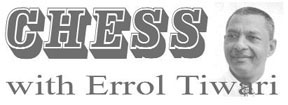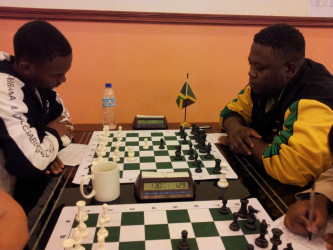At times, the column focuses primarily on regurgitating chess stories from around the world in juxtaposition to highlighting what is happening locally. Some believe there is simply no comparison in that regard, because we learn from the masters and their games, in addition to relishing the exploits of active chess players from other countries. Simultaneously, we continue to experience a severe paucity of tournament chess locally. Guyana remains a limited (in numbers and rank) chess-playing country and has been like that for at least a century. At present, we are a member of the World Chess Federation, the game’s governing body, and we have a single vote at the quadrennial congress when it meets to elect a new president or re-attach itself to the incumbent one. One hundred and seventy countries, including chess behemoths as the United States, England, Russia, China, France, Germany, India and Norway, have the identical single vote to decide on the election process at the appointed time. In this particular instance, Guyana’s importance within the chess world is underlined. It becomes necessary therefore, for us to focus on removing those obstacles which haunt us, and keep us on the periphery of the ancient game.
 Guyana’s finest achievement in recent memory was our participation at the 2014 Chess Olympiad in Tromso. Anthony Drayton played our top board with vitality, followed by Greenidge, Feng and Mrs Thomas. They all gained additional FIDE rating points and Drayton secured the title of Candidate Master. Soon after the Olympiad, Guyana hosted the Umada Chess Cup where the Caribbean and neighbouring Suriname were represented. Since then tournament chess had waned, until it was re-energized last month. Some say it was a lack of playing facilities which caused the unwarranted disruption of the board game. If such a claim is accurate, it is disappointing and sad. Disappointing because the chess public were unaware of the cause which generated the difficulties in the first instance; and sad because sympathizers of chess would, probably, have been willing to render the assistance as required.
Guyana’s finest achievement in recent memory was our participation at the 2014 Chess Olympiad in Tromso. Anthony Drayton played our top board with vitality, followed by Greenidge, Feng and Mrs Thomas. They all gained additional FIDE rating points and Drayton secured the title of Candidate Master. Soon after the Olympiad, Guyana hosted the Umada Chess Cup where the Caribbean and neighbouring Suriname were represented. Since then tournament chess had waned, until it was re-energized last month. Some say it was a lack of playing facilities which caused the unwarranted disruption of the board game. If such a claim is accurate, it is disappointing and sad. Disappointing because the chess public were unaware of the cause which generated the difficulties in the first instance; and sad because sympathizers of chess would, probably, have been willing to render the assistance as required.

More competition in chess is necessary if we are to progress in the different phases of the game. If we do not have official tournaments, we would not have the designated chess authority, nor eventual chess stability. And things would soon fall apart.
More competitions for our players mean securing higher ratings, and higher ratings would lead to the creation of a certain kind of chess dominance in the Caribbean for Guyana. Altogether, time is precious in this regard. Younger players are becoming international masters and grandmasters. Therefore, we can make a deep and concerted effort to expose our younger folks to the intricacies of the game early in their lives. For international competition, we can consider engaging the Suriname Chess Federation and even perhaps the Trinidad and Tobago Federation as these countries are close, geographically. And we can acquire additional skills in engaging those two chess-playing nations. Our budding players, in addition to our senior ones, would learn from each of the two separate, or combined excursions.
A hopeful sign is the Guyana Chess Federation’s intention of hosting an Emancipation Day chess tournament featuring the strongest juniors and seniors. This is commendable. We are all awaiting this tournament.
In international chess news, at the Biel Chess Festival in Switzerland, Maxime Vachier-Lagrave is leading the strong six-member grandmaster tournament after three rounds. The tournament has a unique feature, in that draws are forbidden for the first 40 moves. The games would be available next Sunday.









